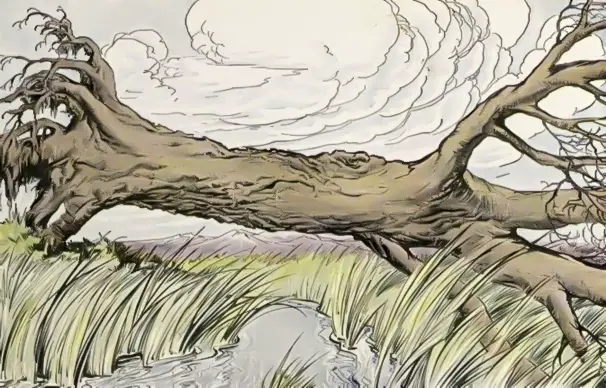The Oak and the Reed (from the Fables of Aesop)

Մի՛ շատ պարծիր թէ ուժով ես,
Հով մը կու գայ խեղճ կ’ընէ քեզ։
Կաղնի ծառը
Խրատ է մեծամեծ հարուստներուն` որ հպարտութեամբ կ’անարգեն աղքատները. բայց շատ անգամ ասոնք իրենց վիճակով հանգիստ կը մնան, եւ հարուստները աշխարհքիս հովերովը կը կործանին կ’իյնան։
An oak, which hung over the bank of a river, was blown down by a violent storm of wind; and as it was carried along by the stream, some of its boughs brushed against a Reed which grew near the shore. This struck the Oak with a thought of admiration; and he could not forbear asking the Reed, how he came to stand so secure and unhurt, in a tempest which had been furious enough to tear an Oak up by the roots? 'Why,' says the Reed, 'I secure myself by putting on a behaviour quite contrary to what you do; instead of being stubborn and stiff, and confiding in my strength, I yield and bend to the blast, and let it go over me; knowing how vain and fruitless it would be to resist.'
Though a tame submission to injuries which it is in our power to redress, be generally esteemed a base and a dishonourable thing; yet, to resist where there is no probability, or even hopes, of our getting the better, may also be looked upon as the effect of a blind temerity, and perhaps of a weak understanding. The strokes of fortune are oftentimes as irresistible as they are severe; and he who, with an impatient reluctant spirit, fights against her, instead of alleviating, does but double her blows upon himself. A person of a quiet still temper, whether it is given him by Nature, or acquired by art, calmly composes himself, in the midst of a storm, so as to elude the shock, or receive it with the least detriment; like a prudent experienced sailor, who is swimming to the shore from a wrecked vessel in a swelling sea, he does not oppose the fury of the waves, but stoops and gives way, that they may roll over his head without obstruction. The doctrine of absolute submission in all cases is an absurd dogmatical precept, with nothing but ignorance and superstition to support it: but, upon particular occasions, and where it is impossible for us to overcome, to submit patiently is one of the most reasonable maxims in life.


Comments
Post a Comment